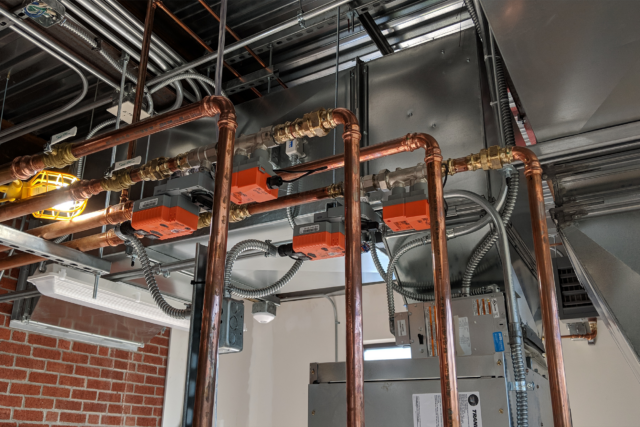Frequently Asked Questions: Building Commissioning

Building commissioning, a systematic quality assurance process, is now required by energy code—and we have answers to your questions.
Q: Why is building commissioning important?
A: Over time, the wide range of equipment and systems incorporated into K-12 schools have become increasingly complicated and closely integrated. Design and construction requirements have also evolved, requiring buildings to meet more complex code requirements, minimize energy consumption, and promote occupant wellbeing.
Q: Is building commissioning mandatory? What does it mean for my school?
A: The current energy code requires new or renovated building mechanical systems, service water heating, and lighting control systems to undergo commissioning. Projects are eligible for exceptions based on total heating and cooling loads, but generally speaking any medium-to-large project will now require some extent of commissioning.
Q: Why do I need a commissioning agent (CxA)? Aren’t these services already provided by the design engineer and installing contractors?
A: Not necessarily. Although designers and installers are crucial to the construction process and are integral members of the commissioning team, most projects require the specialization of a CxA. Plus, when projects are bid, commissioning services aren’t always included in the scope or fee. Although the design engineer is usually capable of performing commissioning, many clients choose an independent team.
Q: How does the commissioning process for existing buildings differ from the new construction commissioning process?
A: Existing building commissioning (EBCx) follows the same general standards and best practices as new construction commissioning. However, the CxA has no ability to influence design decisions or the construction process on EBCx projects. Also, the original installing contractors are typically not under contract to support the process and as-built documentation may not be available.
Q: Are there any incentives available to help me complete existing building commissioning at my District?
A: Yes! NYSERDA recognizes existing building commissioning as a way to increase efficiency and will cover 50% of the cost of an eligible project. These projects can be a good idea to identify energy saving opportunities, diagnose equipment issues, establish the cause of ongoing comfort complaints, and prioritize facility improvement measures.
Q: When should the commissioning agent be hired?
A: For new construction and renovation work, the CxA should be engaged during the pre-design or design phase. On complex projects, CxA involvement during the design phase helps to ensure owner requirements are properly evaluated, allows the CxA to provide constructive input on design documents, and facilitates the planning of the construction-phase commissioning process. To commission an existing building, the CxA’s efforts should be coordinated in a way that accommodates the in-use facility’s daily functionality.